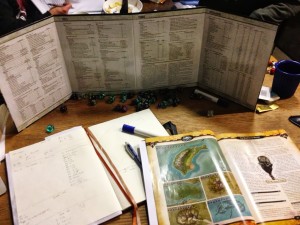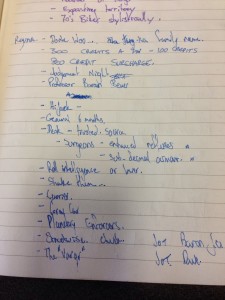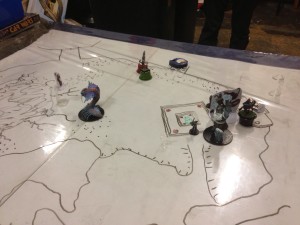 The hard part about being the Gamesmaster is the building of adventures and preparation every week, fortnight or however often you play. Not to mention all the things that you need to balance in the game as well! Each week you should spend more time than your players thinking about the game and making decisions of what you will do in reaction to expected players actions. All the players need to do is show up with dice and a character sheet. Every now and again they also have to level up also. But that is not how it has to be.
The hard part about being the Gamesmaster is the building of adventures and preparation every week, fortnight or however often you play. Not to mention all the things that you need to balance in the game as well! Each week you should spend more time than your players thinking about the game and making decisions of what you will do in reaction to expected players actions. All the players need to do is show up with dice and a character sheet. Every now and again they also have to level up also. But that is not how it has to be.
Players are a great resource for you to tap into as a GM. It is a mistake to think that you have to do everything in a game alone. Preparation and story is largely up to you, be that in the form of reading a module or creating the game for each session but there is homework that the players can do that will assist you in cutting down some time on this component.
How to get your players on board
Why would a player do this though if it so easy just for them to show up, play and go home, nothing further to do? It is called bribery! You are the person in control of certain aspects of the game like hero points or experience or advancement. Whatever your game uses to make your players increase in skill. To encourage this “out of game” behaviour you can sit down and say that you are willing to offer up some of what they want for what you want them to do. the reward should be a token reward but also not so little that no one takes you up on it. My players all provided me with detailed backgrounds that made for a much more immersive experience for us all just for a single hero point!
 The Journal
The Journal
What you are seeking in a game is to have the players visualise their characters and the scenes that they are playing in. The first trick that can increase this immersion is to have some of the players write up from their characters perspective what happened in the previous game. There are websites out there that facilitate this (like Obsidian Portal) that enable the player to put up notes and stories revolving around the game and their character’s perspective. These stories are really valuable as it helps players refresh their memory of what happened last game and puts themselves into character as they hear it from another character’s perspective, not the player.
The Chronicler
So, you may have someone that likes writing updates or reading a journal before each game, but what if someone wants to record the details of the whole session and build up a dot point chronology? Great! I do this a lot in my games that I am a player in as I tend to get bored waiting for my turn so I sit with an open notebook and attempt to record the whole of the adventure in dot point format. I could then offer this up to the GM as a source of information that could be placed on the campaign website or just loose leaves into a folder that players can look back over and reminisce on. It is a great way to record all the awesome funny quotes and the like in such chronicles as well.
Initiative Monitor
You could argue as the GM that the previous two don’t really take much off your plate (they would for me) but here is a role that can save heaps of time. Have a player take over the role of recording and announcing turns via the initiative system in your game. There is no real need for you to have to manage this portion of the game and it is a serious overhead in game. If you are a GM that likes to keep the initial initiative of your creatures secret, just have the initiative monitor add them as they occur on first round!
 The Mapper
The Mapper
If you use a lot of encounter based maps or have the players travelling through a dungeon or the like it can be good to have a mapper. With some accurate descriptions the mapper records only the parts of the map that the players have investigated. It saves you having to draw it out or clumsily cover the areas you don’t want them to see as you show them your copy of the map. These maps can also be handed over to the chronicler at a later stage to start forming the game’s portfolio!
The Accountant!
This is one that I had not thought about recently. The accountant records all the treasure that is found on a “ledger” and then records what went to whom. That way if one of the players says “What happened to the ring of doom that hobbit found?” the Accountant can take a quick look at the “ledger” and give an accurate answer. This saves you, the GM, having to then make copious notes about this stuff or wrack your memory and stop the flow of the game to consider the issue.
What about other roles?
There is no need to stop making roles. If the GM has a need and can think how the player could fill that role then go for it. This can even be situationally based e.g. a player falls unconscious so the GM might ask them to take on one or more of the NPC/Creature rolls for the battle to keep them occupied and to give the GM a bit of a breather in a complicated battle. Really, any roles that a GM can share will get the players more involved and give the GM a little bit of relief from all of the responsibilities to keep the game running! Give some of these a try and see how they work out!
Mark Knights is 39 year old guy living in a small rural town called Elliott in Tasmania, Australia. I have been role playing since I was 11 years old playing the original versions of Dungeons and Dragons, MERP, Elric, Dragon Warriors and the like amongst other genre games. I played D&D 2nd Edition through the 90′s but I ran Earthdawn for my fantasy setting and loved it as a GM. When 3rd Edition came out for D&D I tried it but found it too heavy on rules. I ignored the 3.5 edition of DnD in favour of Earthdawn (big mistake) as I thought it was just a money spinner. When 4th Edition DnD came on my players and I gave it a red hot go but hated what it had dumbed the game down to be. On a trip to Melbourne to buy some 4E stuff from a hobby store an old mate of mine pointed me at Pathfinder and in a Fantasy setting I have never looked back.

I read something similar to this a few months back.
I think this is more an inexperienced groups problems. If my group doesn’t want to map, they get lost. If they choose not to write story details down ,they miss important clues (& sometimes get clobbered). Initiative monitor? I use round cards, I as the GM want to control the flow of battle. Round cards work great, roll unit, sort cards & hold them up for players to see. Accountant, my players are greedy sneaks, nobody shares what they’ve got, party treasure bahhhh….
So while these might be great ideas for casual or inexperienced groups, I just don’t think its necessary for hardcore veterans …
Mapping is not a big issue for us. We tend to go gridless and only use a map for basic representation.
Yeah, story details are sometimes lost, but between the lot of us we tend to keep up fairly well.
I liked the init idea. My flow tends to get broken at init time despite experimentation with various methods of tracking it. Seems a silly thing to get hung up on, but it always seems a stumbling block to me! And that is despite years of running things!
My groups are usually pretty free with group treasure. Very few squabbles. We do tend to use an “accountant” role though. Mainly because it frees up time in-game I think. One person records the loot and then between sessions it tends to get sorted out. So for us, it is more of a saving time during our face time than anything else. Record the treasure, move on during the game, and sort it out between sessions on our private group forums.
Mark, good stuff. Hadn’t considered an Initiative Monitor before, nor giving incapacitated characters some job or role in the combat – I like it. Nice article.
Upon a friend’s suggestion I just started something along the lines of what you suggested for player-contributions to the Adventure Log. After each session I post (on Obsidian Portal) a 50’s-style skeleton outline of what happened & award XP to players that plug in 200+ word descriptions of specific scenes from their character’s perspective. So far so good.
I started out being opposed to awarding XP for out-of-game things…but I’ve let that opinion go & am all about bribing them now! Haven’t fallen so far as to award XP for bringing the GM food & such but, in addition to Adventure Log contributions, there are XP spiffs for being on-time to each session & getting me their updated character sheet PDFs in-between sessions.
Dra8er, hadn’t heard of “Round cards” before – I’m intrigued.
Thanks for the feedback guys. My in person players would all consider themselves hardcore gamers unfortunately Dr8er but they are incredibly lazy. I like to think that one day they will get it together but I doubt it. I do love giving my monsters over so if someone is down and likely to be for a while they can take a bit of the load off in combat.